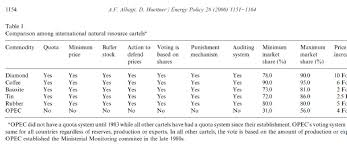Thread on restructuring #OPEC
1. It is time to restructure OPEC and create a new organization with a new mandate. The current Organization does not reflect the reality of global oil markets and does not reflect the current vision of its members. #oil #shale
1. It is time to restructure OPEC and create a new organization with a new mandate. The current Organization does not reflect the reality of global oil markets and does not reflect the current vision of its members. #oil #shale
2. Data & statistical analysis indicate that OPEC has never been an effective organization in managing the oil market (and never been a cartel). Some journalists and politicians ascribed the power of Saudi Arabia and its allies to OPEC
3. Some Non-OPEC members have increased oil production drastically, especially in the United States, Russia and Brazil, and therefore, minimizing its effectiveness of OPEC, if there is one.
4.Saudi Arabia's insistence on expanding cooperation among oil-producing countries to include 10 non-OPEC countries, including Russia, and the formation of OPEC+ proves the point that OPEC lost its relevance in its existing format.
5.OPEC initial agreement was based on production for relevant reasons at the time: International oil companies (IOCs) controlled reserves & production. Government revenues were tied to production, which is exported almost in full. Hence, OPEC founders focused on production.
6. Now the situation is different. National Oil Companies (NOCs) control reserves & production. Unlike the past when OPEC was founded, a good part is consumed locally. Another part goes to the petrochemical industry. A third part goes to refineries to export petroleum products.
7. Production vs. Exports: Exports affect global oil markets and oil prices, not production. Hence, OPEC must be restructured to focus on OIL exports rather than production.
That is why some OPEC ministers distinguish between "production" and "supplies"
That is why some OPEC ministers distinguish between "production" and "supplies"
8. Suggested changes: Focus on exports of crude oil, NGLs, & petroleum products. The irony is: global oil demand as reported by OPEC reports include all of them, so why is the focus on crude only? The new OPEC must focus on exports of total oil, not only crude.
9. Not applying the quota to petroleum products and NGLs have caused serious problems in the past and still cause problems now. For example, some countries would be able to comply with OPEC+ quota by reclassifying super light crudes as NGLs! Congratulations! 

10. Voting:
1- One country, one vote, regardless of the size of production and export levels.
2- Agreements are by consensus, giving any member a veto power! Several OPEC meetings failed historically because of this system.
1- One country, one vote, regardless of the size of production and export levels.
2- Agreements are by consensus, giving any member a veto power! Several OPEC meetings failed historically because of this system.
11. Suggested changes: The vote should be changed to reflect the size of exports of each country. The base could be the average of the last 3 months of available data, or the average of the previous quarter because its data is available and has been verified.
12. Should decisions be adopted by consensus, super majority, or absolute majority? A hybrid system could be created to protect small producers. Fateful decisions require consensuses. Important decision requires supermajority of 75% or higher, while routine matters require 51%.
13. Countries with small exports may argue that they have no role in this system. This system encourages them to enter into alliances with other countries so that they can derive additional benefits from these alliances. (next)
14. The system can be developed to focus on the share of countries’ exports in their main markets, not in global demand for oil. This gives small producers more importance. Also, giving these countries the right to veto crucial matters gives them more power than their size.
15. What are the benefits of applying the quota to oil exports instead of production?
Elimination of extreme swings in oil prices so that they fluctuate in a narrower range, which enables oil-producing countries to manage their budgets and economies without any violent shocks.
Elimination of extreme swings in oil prices so that they fluctuate in a narrower range, which enables oil-producing countries to manage their budgets and economies without any violent shocks.
16. Eliminating extreme swings enables investors to invest in the sector without fear of a terrible declines that cause great losses and bankruptcies. Oil companies can mange their assets more efficiently. Banks can loan with lower risk of default.
17. Unlike production, exports can be easily monitored. OPEC will also be able to know type, quality & destination, almost memontarly. Members can agree on certain method of monitoring, including issuance of certificate of origin, which is common in international trade.
18. Monitoring might involve hiring accounting firms and electronic or satellite surveillance. In fact, OPEC members can afford to create the most advanced monitoring system in the world that will pay for itself within a short period.
19. Since oil trade data is instantaneous or semi-real time, OPEC decision makers can adapt to market changes faster & more effectively than the current system. It also reduces competition among some members in specific markets by discovering surpluses and shortages quickly.
20. Focusing on exports of crude, products and NGLs gives a better picture of OPEC's role in meeting global oil demand. It can, in light of the availability of real time data redirect some of the oil tankers to avoid oversupply in some markets.
21. Focusing quota on exports of total oil prevents some members from cheating by reclassifying their oil as NGLs. It also helps some countries direct their investments, or re-direct them since oil products and NGLs are calculated in production quotas.
22. OPEC restructuring also ensures that it is not tried under any circumstance in the United States's courts or elsewhere. It can also get rid it of the historical burden resulting from Western thought that linked OPEC to monopoly on one hand, the oil embargo on the other
23. Perhaps, one of the biggest achievements of Saudi oil policy in recent years is the neutralization of the proposed "no OPEC" legislation in the US by introducing Russia into the OPEC+ and having President Trump ask for a production cut and praising the decision to cut
24. The new OPEC will have an automatic system that will compensate for any loss of exports from any of its members on the condition that the member will gain its market share once it restores exports. Otherwise, a joint storage system could do the job.
To conclude, OPEC needs restructuring to match current market realities and the vision of its members. A shift to export-based quota is needed. Technology have improved beyond imagination and the new OPEC can utilize it to make oil markets more efficient and less volatile.

 Read on Twitter
Read on Twitter



